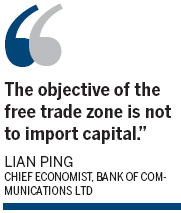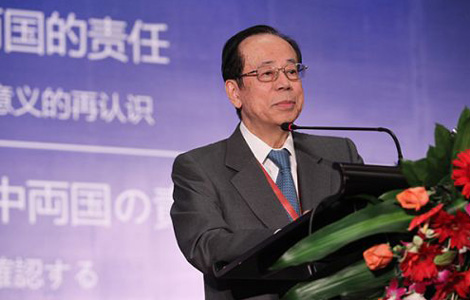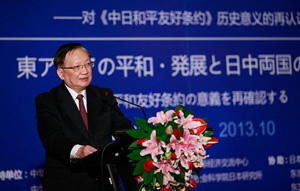Convertibility of FTZ's capital account under the spotlight
Updated: 2013-10-29 07:26
By Xie Yu and Wu Yiyao in Shanghai (China Daily USA)
|
||||||||
Industry insiders are calling for specific details on a move to enable enhanced convertibility of the capital account in the China (Shanghai) Pilot Free Trade Zone, but they also said that effective regulation must be implemented to prevent instability.
"The pilot programs in the Shanghai free trade zone will not only facilitate trade and investment but will also set the direction for China's financial reform," said Qiao Yide, secretary-general of Shanghai Development Research Fund.
The pilot programs, amid goals of interest rate and exchange rate liberalization, will create rich opportunities for financial institutions to provide financing, exchange and clearing services, bankers said.
"For example, offshore business will enable banks to transfer funds not only to the domestic interbank market but also to the global market," said Lian Ping, chief economist at the Bank of Communications Ltd.
The Securities Times, a newspaper run by the China Securities Regulatory Commission, reported on Monday that capital account convertibility will be tested in the free trade zone.
The paper said, citing sources with knowledge of policy decisions for the FTZ, that Shanghai may first be allowed to conduct yuan and foreign currency settlements under the current account for operating entities registered in the zone.
FTZ-based institutions seeking outbound direct investments will be allowed to convert foreign currency using banks in the FTZ and then transfer the funds to other countries directly, while business entities in the FTZ will be allowed to conduct foreign direct investments and cash pooling in yuan and in the currency of the destination country, the report said.

Entities in the FTZ may be allowed to conduct cross-border credit funding in yuan and foreign currencies, but the funds will only be allowed to be used within the FTZ or abroad. Banks and financial institutions in the FTZ may use marketized pricing systems, but banks within the FTZ will not be allowed to absorb domestic deposits from outside the zone, according to the Securities Times report.
"Entities" in the FTZ may not include individual investors, the source said, according to the Securities Times.
The State Council, China's cabinet, formally announced the rules for the new Shanghai FTZ in late September. Outlined goals include upgrading financial services, promoting trade and improving governance.
Analysts said the pilot zone will usher in reforms in the financial sector, which has been tightly regulated for a long time.
The zone is expected to serve as a laboratory for financial experiments before they are rolled out elsewhere in China. No timeline has been given for any changes, but rules in the zone will be introduced over a three-year period, according to the announcement.
Meanwhile, Chinese economists are debating ways to integrate China's financial markets with global markets while controlling the risks.
"The objective of the free trade zone is not to import capital," said Lian. He stressed that capital flows between the offshore financial center and the rest of China should have limits.
He said that China should be very cautious when handling capital flows between the zone and the rest of the country, to avoid sudden capital flows, which may create bubbles in the economy and increase risks in the shadow banking system.
"The devil is in the details," said Wang Jianye, chief economist at the Export-Import Bank of China, noting that financial authorities such as the People's Bank of China and the China Banking Regulatory Commission should work out a feasible and detailed roadmap to achieve full convertibility of the capital account in a step-by-step fashion.
"I think that Shanghai could be two things: either another Hong Kong, where assets could be freely traded, which I do not think is that much progress, or a filter in the country, where all the institutions located there will be subject to specific regulations and be able to go through Shanghai to the mainland," said Ousmene Mandeng, managing director at Pramercia Investment Management.
Contact the writers at xieyu@chinadaily.com.cn and wuyiyao@chinadaily.com.cn
(China Daily USA10/29/2013 page16)

 Ellis Island reopens for 1st time since Sandy
Ellis Island reopens for 1st time since Sandy ABC apologizes for 'Kimmel' joke
ABC apologizes for 'Kimmel' joke Lang Lang named UN Messenger of Peace
Lang Lang named UN Messenger of Peace
 Snowfall hits many areas of Tibet
Snowfall hits many areas of Tibet  Antiquated ideas source of Abe strategy
Antiquated ideas source of Abe strategy
 Storm wrecks havoc in S Britain, leaving 4 dead
Storm wrecks havoc in S Britain, leaving 4 dead
 Women's congress aims to close income gap, lift status
Women's congress aims to close income gap, lift status
 Sao Paulo Fashion Week held in Brazil
Sao Paulo Fashion Week held in Brazil
Most Viewed
Editor's Picks

|

|

|

|

|

|
Today's Top News
Hawaii debates over gay marriage legalization
Kerry urges Iran to show nuke program peaceful
Albright counsels fact not myth in relations
Is Obama's lack of transparency really his fault?
San Diego Symphony debuts at Carnegie
Lang Lang takes on UN `Messenger of Peace’ role
Fonterra botulism scare laid bare in board inquiry
At 72, China's 'Liberace' still wows fans
US Weekly

|

|







